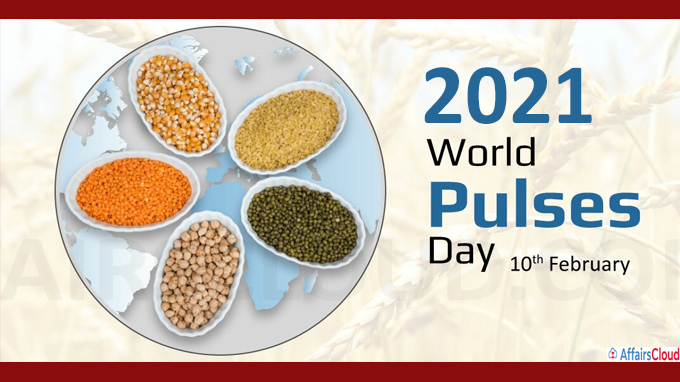 The United Nations(UN)’s World Pulses Day is annually observed across the globe on 10th February to celebrate the contribution of the pulses to the sustainable food system, healthy growth and environmental benefits.
The United Nations(UN)’s World Pulses Day is annually observed across the globe on 10th February to celebrate the contribution of the pulses to the sustainable food system, healthy growth and environmental benefits.
The First World Pulses Day was celebrated on 10th February 2019.
Background:
i.The United Nations General Assembly(UNGA) adopted the resolution A/RES/73/251 on 20th December 2018 and proclaimed the 10th February of every year as the World Pulses Day.
ii.The World pulses day was proposed by Burkina Faso, following the success of the International year of pulses and recognising the potential to achieve the 2030 Agenda for Sustainable Development with relevance to the sustainable development goals, 1, 2, 3, 5, 8, 12, 13 and 15.
International Year of Pulses- 2016:
i.The UNGA adopted the resolution A/RES/68/231 on 20th December 2013 and proclaimed the year 2016 as the International year of pulses.
ii.The celebration of the year was led by the Food and Agriculture Organization (FAO) of the United Nations.
iii.The theme of the International Year of Pulses 2016 was “Nutritious Seeds for a Sustainable Future”.
Events 2021:
i.The celebration of the 2021 World Pulses Day will be organised as a virtual on 10th February 2021 under the theme #LovePulses for a healthy diet and planet.
ii.The celebrations will support to create awareness and recognise the contribution of pulses in a sustainable food system and healthy diet.
iii.FAO Liaison Office with the United Nations in New York in collaboration with Emerging Ag Inc. held a virtual event to celebrate World Pulses Day. The event was co-organized by the Permanent Missions of Burkina Faso, Guyana and Malawi to the United Nations (UN).
Pulses:
i.Pulses which are also known as legumes are edible seeds of leguminous plants which are cultivated for food.
ii.The pulses does not include the harvested green like green peas and beans, and also excludes the seeds used for oil extractions like soybean and groundnut.
iii.Some of the well-known pulses are dried beans, lentils and peas.
Importance of Pulses:
Nutrition:
i.The pulses are low in fat and rich in soluble fiber which lowers the cholesterol and helps to control blood sugar.
ii.These are also recommended for the management of non-communicable diseases like diabetes and heart conditions.
Environmental benefits:
i.The pulses have nitrogen fixing properties which improves the fertility of the soil and enhances the productivity of farmlands.
ii.This will also reduce the usage of artificial fertilisers reducing the greenhouse gases released during the manufacture of these fertilisers.
iii.Usage of pulses for intercropping and cover crops promotes the farm and soil biodiversity.




